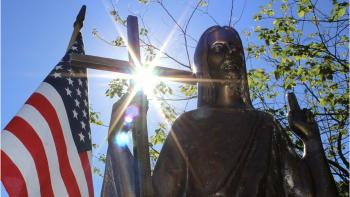The air smells of smoke and hot dogs, the sky is alight with colorful sparks, and we sing “I’m proud to be an American, where at least I know I’m free!” But amidst the barbecues and anthems every Independence Day, do we ever stop to wonder: what does it really mean to be free?
For Catholics, this question has a beautiful but complex answer. Despite what popular culture might think, freedom is not simply the ability to do whatever we want. Yes, God has given humans “reason” and “will,” which allow us to choose and act for ourselves, but He designed and bestowed that ability with a specific purpose. The magisterium declared in Gaudium et spes that God made mankind free “so that [man] can seek his Creator spontaneously and come freely to utter and blissful perfection by cleaving to Him.” In other words, God gave us freedom so that we can love and choose Him without coercion—so we can be happy with Him forever.
Any object is only truly itself when we use it for its proper purpose. For example, in Disney’s The Little Mermaid, Ariel finds a human fork and considers it a treasure, but she uses it to style her hair and calls it a “dinglehopper.” That fork is not achieving its greatest potential as a fork since Ariel is not using it to eat and serve food. It seems fitting that she does not call it a “fork” at all. We can say the same for freedom. When we use our freedom to choose evil or disobey God, that act is an abuse of our freedom, a fundamental misunderstanding of what sort of treasure this gift really is. The fork does not disappear, and neither does God revoke our freedom. But just as the misused fork is less of a fork, misused freedom is less free.
The Catechism says that abusing our freedom leads to the “slavery of sin.” How many times do we see this truth in our own experience? The more we choose sin, the harder it is to reverse and choose the good. Rather than feeling like we are free to do whatever we want, we feel a struggle and inability to do what we know is right—and isn’t that what we really want? “What I do, I do not understand,” St. Paul writes about the slavery of sin, “For I do not do what I want, but I do what I hate.” Unbridled, abused freedom ends up collapsing in on itself and failing to even be the “do whatever you want” state that seems so attractive, since it traps us in bad habits and makes our pursuit of “utter and blissful perfection” less spontaneous and happy. To be free according to God’s design is to be able to choose God for ourselves with joy and ease.
So, as we listen to the whizz of fireworks and recall the principles upon which the Founders built America, let us remember what freedom really is. The preamble to the Declaration of Independence says “[All people] are endowed by their creator with certain unalienable rights,” and “among these are life, liberty, and the pursuit of happiness.” As Catholics, we should hold these rights together and see our liberty as inherently made for the pursuit of eternal life and perfect happiness.
By Genevieve O’Connor, Communications Specialist and Campus Minister of Muhlenberg College, Allentown. She holds an MTS in Moral Theology from the University of Notre Dame and an MFA in Creative Writing from DeSales University, Center Valley.
Photo by OSV News photo/Bradley Birkholz.








